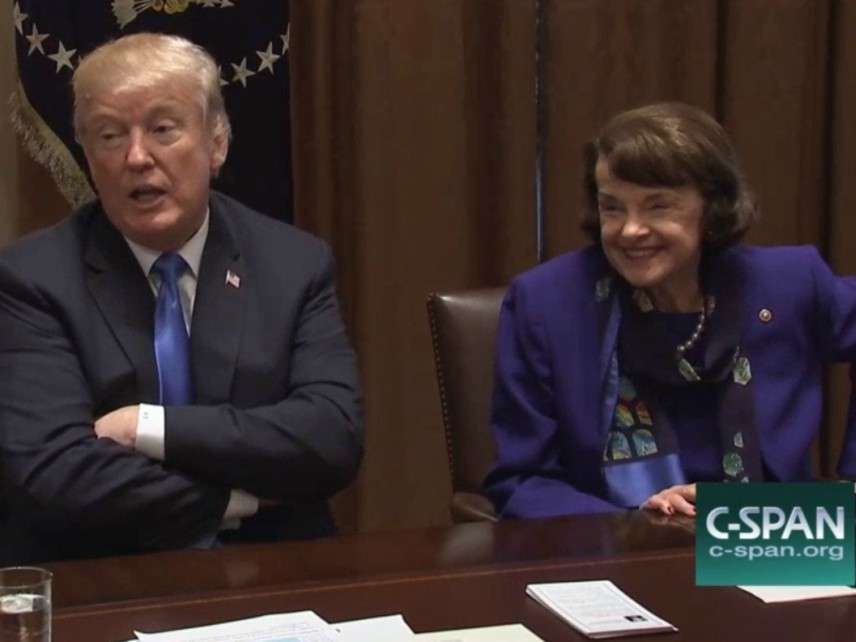Trump the 'Big Second Amendment Person' Becomes 'Trump the Gun Grabber'
Trump's embrace of gun control is consistent with his views before he ran for president.

Donald Trump's embrace of gun control during a meeting with members of Congress yesterday was startling to anyone who took seriously his pose as a staunch defender of the Second Amendment during his presidential campaign. But it looks more like a reversion to his actual opinions if you take a longer view.
Yesterday Trump assured legislators that he will soon impose an administrative ban on bump stocks and said he supported legislation aimed at encouraging the sharing of information with the FBI's National Instant Criminal Background Check System (NICS), which is used to clear people who buy guns from federally licensed dealers. The National Rifle Association supports both of those measures. But Trump also spoke favorably of requiring background checks for all gun transfers, raising the minimum age for buying long guns, pre-emptively confiscating guns from people who might be dangerous, and even banning so-called assault weapons, to the visible delight of Sen. Dianne Feinstein (D-Calif.). The NRA opposes all of those ideas, as do the vast majority of Republicans in Congress.
"While today's meeting made for great TV," said NRA spokeswoman Jennifer Baker, "the gun control policies discussed would make bad policy that wouldn't keep our children safer." The New York Times reports that Trump's comments "prompted a frantic series of phone calls from N.R.A. lobbyists to their allies on Capitol Hill." Breitbart News, an early and steadfast Trump booster, ran a story under the headline (since revised) "Trump the Gun Grabber."
In 2016 Trump was enthusiastically backed by the NRA, which spent more than $30 million on ads and other communications aimed at electing him and defeating Hillary Clinton. The unprecedented support was driven not just by Clinton's anti-gun views but by Trump's public statements about the folly of gun control and the importance of the right to armed self-defense.
"I am against gun control," Trump announced at the 2011 Conservative Political Action Conference. He declared himself "a very strong person on the Second Amendment" in a 2013 interview with Fox News. "I'm a big Second Amendment person," he told CNN in 2015. "I believe in it so strongly, and if you take the guns away from the good people, and the bad ones are going to have target practice." In his 2015 book Great Again, he said he was "very much in favor of making all concealed-carry permits valid in every state" (a policy he rejected yesterday as politically unfeasible).
Trump continued in the same vein during the presidential debates. Asked during a January 2016 debate whether there were "any circumstances" in which the government "should be limiting gun sales of any kind in America," he replied, "No. I am a Second Amendment person." Trump promised to appoint Supreme Court justices who would "uphold the Second Amendment" and said he would abolish "gun-free zones" around schools. His most significant deviation from the NRA line was his support for blocking gun sales to people on the FBI's "watch lists" (which the NRA resisted on due process grounds).
At the NRA's annual convention in April 2017, Chris Cox, executive director of the NRA Institute for Legislative Action, called Trump "the most proudly pro-gun presidential candidate" in U.S. history. "I am going to come through for you," Trump told the attendees. "You have a true friend and champion in the White House."
Given all that, you can understand why the NRA might be a bit disappointed by Trump's sudden alliance with gun controllers. But prior to 2011, when Trump was already contemplating a bid for the GOP presidential nomination (although he did not register as a Republican until the following year), his views on gun control were pretty much what you'd expect from a New York Democrat, which he was from 2001 to 2009.
In his 2000 book The America We Deserve, Trump backed "the ban on assault weapons" and "a slightly longer waiting period to purchase a gun," suggesting three days would be about right. (The federal "assault weapon" ban has since expired, and there is no federal waiting period for gun buyers, who are generally cleared by NICS within a few minutes.) Trump faulted both Democrats who "want to confiscate all guns," which he called "a dumb idea," and Republicans who "walk the NRA line and refuse even limited restrictions."
The Trump of 2000 is the Trump who attended yesterday's meeting. "Some of you people are petrified of the NRA," he said. "You can't be petrified." He even accused Sen. Patrick Toomey (R-Pa.), who took a lot of heat from the NRA for backing "universal background checks" (which Trump now supports) in 2013, of questioning a higher purchase age for rifles only because "you're afraid of the NRA."
To be sure, Trump also called himself "a big fan of the NRA" and "the biggest fan of the Second Amendment." But his main message was that Congress should pass a "comprehensive" bill that splits the difference between the two sides and seems to do something about mass shootings. That position is consistent with the views Trump expressed before running for president. It also makes sense if we assume that Trump, as usual, is bored by policy details and ultimately does not care very much about this issue one way or the other.
How else to explain Trump's blithe recommendation that police "take the guns first" and "go through due process second" when they encounter someone they think might be dangerous? That comment, which reflects Trump's authoritarian instincts and his general disregard for civil liberties, pretty conclusively demonstrates that he does not attach much value to the rights guaranteed by the Second Amendment. He became a "Second Amendment person" for the same reason he became an anti-abortion person, and he is equally sincere about both.


Show Comments (190)